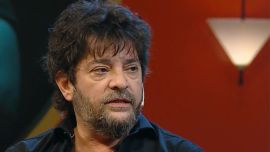Over the past few weeks the nation’s most divisive characters have taken over the political agenda once again, which in turn has generated serious uncertainty regarding Argentina’s short and long-term economic plans.
Former presidents and deep antagonists Mauricio Macri and Cristina Fernández de Kirchner have proven once again that they are our prima donnas, with their utterances becoming the topic of conversation in every café across the nation and the cover of every major newspaper. Our obsession with Cristina and Macri explains one of the factors of our chronic decrepitude: disunity.
The duo’s public re-appearances force us to question whether they are conscious of what the sensation of disgust they generate among a majority of Argentines, given they lead disapproval indexes across the board, which in turn begs the question: are they acting rationally? One could argue that Fernández de Kirchner’s latest speech generates serious difficulties for Economy Minister Martín Guzmán in his negotiations with the International Monetary Fund, as suggested by this week’s bond sell-off. It would also be fair to say that Macri’s current media raid to promote his book could fuel further internal bickering within the opposition Juntos por el Cambio coalition, damaging governability. What appears clear is that both of them are preaching to the choir ahead of a tough electoral season in the midst of a global pandemic and a tough recession.
During a public appearance at a rally commemorating the 45th anniversary of the March 24 coup d’etat that led to the 1976-1983 military dictatorship, Cristina returned to her old ways, taking the stage to deliver a long and politically charged speech. She accused the Macri family of having taken advantage of the dictatorship to become wealthy, while also helping to put the country further in debt while in office. With Minister Guzmán at the IMF headquarters in Washington DC to meet chief Kristalina Georgieva and other key Fund officials, CFK sent a clear message: “We don’t have the money to pay, and I believe this March 24th should help ups reflect about the urgent need to return to a model based on production and job growth.” She went on, noting that while she never vacationed in Moscow, thanks to the government’s relationships with Russia and China, Argentina was able to secure a few million doses of vaccines in a world of scarcity. “Even though I like [to vacation in] New York, I know how to defend the rights of all Argentines, and, watch out for those how celebrate our dependence on the United States at the Embassy in cowboy outfits – like Jessie from Toy Story,” she added in clear reference to PRO party leader Patricia Bullrich.
Is the vice-president acting rationally, picking a fight with the United States while Guzmán is locked in negotiations with the IMF, our biggest creditor? That same day, Foreign Minister Felipe Solá announced Argentina’s formal resignation to the Lima Group, which holds an aggressive stance against the Nicolás Maduro regime, in line with the United States. On the 45th anniversary of the coup that led to Argentina’s bloodiest military dictatorship, is it a good sign to align the national interests with a regime widely considered to be dictatorial?
After last week’s book launch, Macri went on a news raid that included interviews and live appearances on social media. At the ideologically aligned cable news channel LN+ – which is owned by daily La Nación and said to be financed by Macri’s allies – the former president insisted that Alberto Fernández’s government “will fail,” adding: “We have no foreign policy, no economic policy, no one knows what this administration wants and it has abandoned the people through policy that fosters delinquency.” He suggested Cristina wants him behind bars and that she is “out of touch with reality.” In a second interview with another ideologically aligned media group, in this case Radio Mitre — which is owned by Grupo Clarín — Macri went after the Alberto Fernández directly, noting “the president doesn’t fulfill any of the things he promises, he contradicts himself in 24 hours.” He suggested the Fernández-Fernández administration rejects scientific evidence and has fumbled the vaccination campaign, calling them “inept.” To the surprise of most Peronists, Macri then explained: “This Kirchnerite version of Peronism has forgotten [Juan] Perón’s old adage. We represent those who want to work. If Perón were still here, he’d say ‘I’ll sign up for Juntos por el Cambio.’”
Is the former president acting rationally when he goes on an all out attack against Alberto Fernández and his VP, questioning their vaccination plan as the second or third wave of the coronavirus pandemic rages on in a world with insufficient vaccines? In a moment in which the Covid-19 crisis adds to a deep economic contraction that was exacerbated by Macri’s economic ineptitude, does the ex-president have logic on his side when talking about this administration’s incapacity? And, with elections around the corner, does it make sense to provoke moderate Peronists by saying Perón would belong to his center-right coalition?
The unifying thought has to be the electoral campaign. Both Cristina and Macri are rallying their respective popular bases by telling them what they want to hear. For Fernández de Kirchner, the strategy is to blame the United States and the IMF for our economic problems, while characterising Macri as a living exemplification of everything that is wrong with Argentina. For Macri, the plan is to point out the ineptitude and corruption of populist movements, ascribing the former to Alberto and the latter to Cristina. In both cases, they need each other in the political ring in order to duke it out. A recent poll by Synopsis Consultores had CFK with a 66.3 percent disapproval rating with MM at 54.9 percent.
Once again, with these levels of disapproval, is their very high public exposure a good idea during an election that promises to be defining? The recent past may serve as an example: after leaving office, the vice-president had similar levels of disapproval and analysts suggested her “ceiling” stood somewhere around 20 to 30 percent of the vote at an electoral bout. Smartly, she picked a moderate to lead the ticket and build a pan-Peronist alliance that handily beat Macri’s ruling coalition. In 2015, Macri won the presidency by managing to take the deeply anti-Peronist vote along with a large groups of moderates that had become disillusioned with Kirchnerism.
They are both playing their games and talking to their people. The problem is we’re stuck in the middle.























Comments